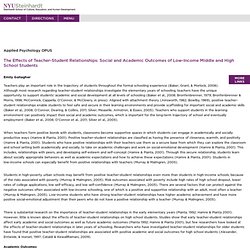

Reciprocal effects of student-teacher and student-peer relatedness: Effects on academic self efficacy. Reform and Resistance in Aboriginal Education. Race Matters: Indigenous Australians and "our" Society. Mal02185. The%20role%20of%20the%20teacher. THE ECOLOGY OF HUMAN DEVELOPMENT - Urie BRONFENBRENNER. Viewcontent. NAS-CBIII-05-1001-005-hamre%20&%20Pianta%20proof. The Effects of Teacher-Student Relationships: Social and Academic Outcomes of Low-Income Middle and High School Students - Applied Psychology OPUS.
Emily Gallagher Teachers play an important role in the trajectory of students throughout the formal schooling experience (Baker, Grant, & Morlock, 2008).

Although most research regarding teacher-student relationships investigate the elementary years of schooling, teachers have the unique opportunity to support students’ academic and social development at all levels of schooling (Baker et al., 2008; Bronfenbrenner, 1979; Bronfenbrenner & Morris, 1998; McCormick, Cappella, O’Connor, & McClowry, in press). Aligned with attachment theory (Ainsworth, 1982; Bowlby, 1969), positive teacher-student relationships enable students to feel safe and secure in their learning environments and provide scaffolding for important social and academic skills (Baker et al., 2008; O’Connor, Dearing, & Collins, 2011; Silver, Measelle, Armstron, & Essex, 2005). There is substantial research on the importance of teacher-student relationships in the early elementary years (Pianta, 1992; Hamre & Pianta 2001).